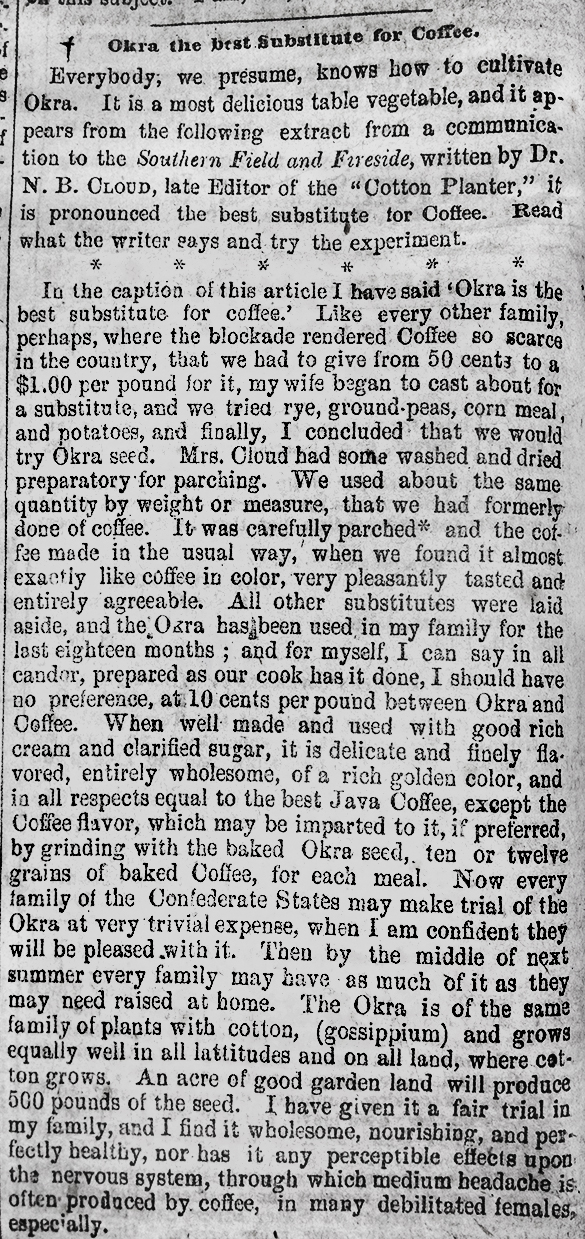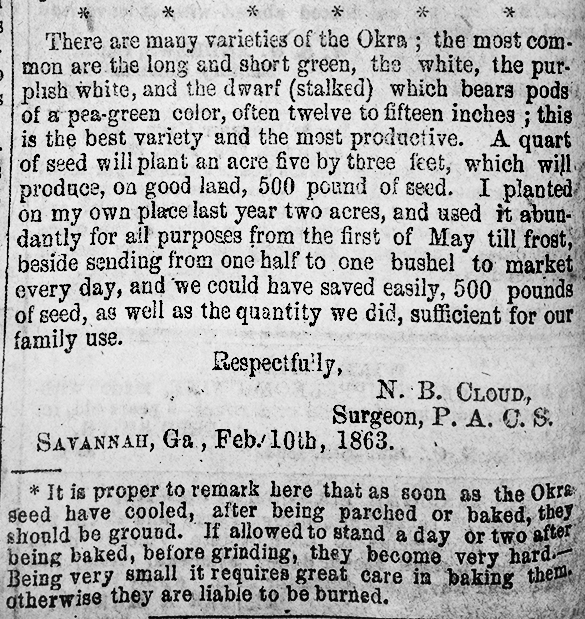Item Description: “Okra the best Substitute for Coffee” (newspaper article), The Daily Journal (Wilmington, N. C.), 21 April 1863, page 2.
Transcription:
Okra the best Substitute for Coffee
Everybody, we presume, knows how to cultivate Okra. It is a most delicious table vegetable, and it appears from the following extract from a communication to the Southern Field and Fireside, written by Dr. N. B. CLOUD, late Editor of the “Cotton Planter,” is pronounced the best substitute for Coffee. Read what the writer says and try the experiment.
* * * * * *
In the caption of this article I have said ‘Okra is the best substitute for coffee.’ Like every other family, perhaps, where the blockade rendered Coffee so scarce in the country, that we had to give from 50 cents to a $1.00 per pound for it, my wife began to cast about for a substitute, and we tried rye, ground-peas, corn meal, and potatoes, and finally, I concluded that we would try Okra seed. Mrs. Cloud had some washed and dried preparatory for parching. We used about the same quantity by weight or measure, that we had formerly done of coffee. It was carefully parched* and the coffee made in the usual way, when we found it almost exactly like coffee in color, very pleasantly tasted and entirely agreeable. All other substitutes were laid aside, and the Okra has been used in my family for the last eighteen months; and for myself, I can say in all candor, prepared as our cook has it done, I should have no preference, at 10 cents per pound between Okra and Coffee. When well made and used with good rich cream and clarified sugar, it is delicate and finely flavored, entirely wholesome, of a rich golden color, and in all respects equal to the best Java Coffee, except the Coffee flavor, which may be imparted to it, if preferred by grinding with the baked Okra seed, ten or twelve grains of baked Coffee, for each meal. Now every family of the Confederate States may make trial of the Okra at very trivial expense, when I am confident they will be pleased with it. Then by the middie of next summer every family may have as much of it as they may need raised at home. The Okra is of the same family of plants with cotton, (gossippium) and grows equally well in all lattitudes and on all land, where cotton grows. An acre of good garden land will produce 500 pounds of the seed. I have given it a fair trial in my family, and I find it wholesome, nourishing and perfectly healthy, nor has it any perceptible effects upon the nervous system, through which medium headache is often produced by coffee, in many debilitated females, especially.
* * * * * *
There are many varieties of the Okra; the most common are the long and short green, the white, the purplish white, and the dwarf (stalked) which bears pods of a pea-green color, often twelve to fifteen inches; this is the best variety and the most productive. A quart of seed will plant an acre five by three feet, which will produce, on good land, 500 pound of seed. I planted on my own place last year two acres, and used it abundantly for all purposes from the first of May till frost, beside sending from one half to one bushel to market every day, and we could have saved easily, 500 pounds of seed, as well as the quantity we did, sufficient for our family use.
Respectfully,
N. B. CLOUD,
Surgeon, P. A. C. S. SAVANNAH, Ga, Feb. 10th, 1863.
———
*It is proper to remark here that as soon as the Okra seed have cooled, after being parched or baked, they should be ground. If allowed to stand a day or two after being baked, before grinding, they become very hard.— Being very small it requires great care in baking tbem, otherwise they are liable to be burned.
Citation: The Daily Journal (Wilmington, N. C.), 21 April 1863, page 2. North Carolina Collection, Wilson Library, University of North Carolina at Chapel Hill; call number C071 Z.



